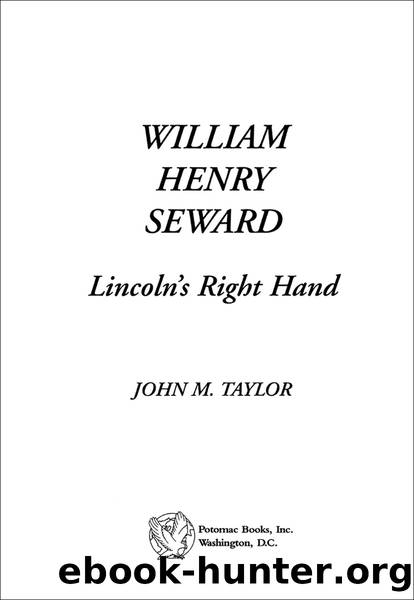William Henry Seward by John M. Taylor

Author:John M. Taylor
Language: eng
Format: epub
Publisher: Potomac Books, Inc.
Published: 1991-09-15T00:00:00+00:00
16
Aggressive Diplomacy
ON JULY 21, 1861, the first Federal offensive into Virginia resulted in a shattering defeat at Manassas. The next day Seward watched the demoralized crowds in the street from his office window. The military debacle was not of Sewardâs making. He felt an indirect responsibility, however, for when Lincoln had polled his advisers, asking which of them opposed General McDowellâs planned advance, Seward had been silent. In any case the aftermath of defeat was an embarrassment for the secretary of state, in that a setback of the magnitude of first Manassas contradicted the administration position that the Southern insurgency was a passing phenomenon. Not for the last time, Seward sent a dispatch to U.S. missions abroad, seeking to minimize he impact of a military defeat:
You will receive the account of a deplorable reverse of our arms at Manassas. For a week or two that event will elate the friends of the insurgents in Europe as it confounded and bewildered the friends of the Union here for two or three days. The shock, however, has passed away, producing no other results than a resolution stronger and deeper than ever. . . . The heart of the country is sound.1
Seward found himself not only in charge of foreign affairs but responsible for articulating Union war aims to the powers of the world. In most countries Sewardâs prestige made him uniquely qualified for this role. Britain, however, was an important exception. There the secretary was widely regarded as an Anglophobe, and an irresponsible one at that. Years of support for the Irish âpatriotsâ had left a paper trail that now came back to haunt Seward. In 1850, in a debate on the Clayton-Bulwer Treaty, he had characterized Britain as grasping and rapacious.2 As recently as November 1860, at a dinner for the visiting Prince of Wales, he had made a flippant remark to the Duke of Newcastle to the effect that as secretary of state it would be his responsibility to insult Britain.3 The duke took the remark with total seriousness, and the reaction of the London press was so critical that Thurlow Weed, then in Britain, felt obliged to write a letter to the Times in Sewardâs defense.
Long before the secretary of state sent his controversial âThoughtsâ to President Lincoln, the British foreign secretary, Lord John Russell, had speculated that Seward might attempt to manufacture a quarrel with Britain as a means of diverting attention from internal U.S. problems.4 Future prime minister William E. Gladstone, with the condescension he employed with ex-colonials, dismissed the American secretary of state as âa vaporing, blustering, ignorant man.â5 Nor were Russell and Gladstone the only Britons who doubted Sewardâs capacity and goodwill; Queen Victoria thought him âoften reckless and imprudent.â6 The loquacious New Yorker, with his sea-to-shining-sea vision of America, was known to believe that the peaceful absorption of Canada by the United States was only a matter of time. Anxiety in Britain over the underpopulated, weakly defended Canadian provinces was heightened by the attitude of the New York Times, which was widely regarded as reflecting Sewardâs views.
Download
This site does not store any files on its server. We only index and link to content provided by other sites. Please contact the content providers to delete copyright contents if any and email us, we'll remove relevant links or contents immediately.
Fanny Burney by Claire Harman(26603)
Empire of the Sikhs by Patwant Singh(23086)
Out of India by Michael Foss(16853)
Leonardo da Vinci by Walter Isaacson(13336)
Small Great Things by Jodi Picoult(7142)
The Six Wives Of Henry VIII (WOMEN IN HISTORY) by Fraser Antonia(5515)
The Wind in My Hair by Masih Alinejad(5095)
A Higher Loyalty: Truth, Lies, and Leadership by James Comey(4964)
The Crown by Robert Lacey(4817)
The Lonely City by Olivia Laing(4802)
Millionaire: The Philanderer, Gambler, and Duelist Who Invented Modern Finance by Janet Gleeson(4478)
The Iron Duke by The Iron Duke(4356)
Papillon (English) by Henri Charrière(4274)
Sticky Fingers by Joe Hagan(4198)
Joan of Arc by Mary Gordon(4110)
Alive: The Story of the Andes Survivors by Piers Paul Read(4033)
Stalin by Stephen Kotkin(3965)
Aleister Crowley: The Biography by Tobias Churton(3640)
Ants Among Elephants by Sujatha Gidla(3467)
